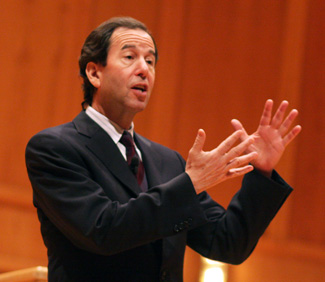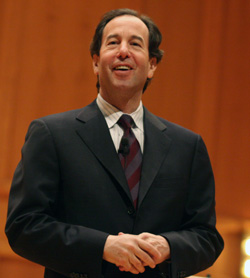One of the nation’s leading scholars in the field of leadership used common examples and newly-elected President Barack Obama as illustrations on successful leadership. Ron Heifetz emphasized throughout his lecture the differences between leadership and authority.
 Heifetz discussed baseball, politics, and medicine as examples of how leaders can fail and how leadership has its limitations. "A baseball player has had a great career if he gets on base 40 percent of the time through walks and hits," Heifetz said, "but obviously failing comes with the territory.
Heifetz discussed baseball, politics, and medicine as examples of how leaders can fail and how leadership has its limitations. "A baseball player has had a great career if he gets on base 40 percent of the time through walks and hits," Heifetz said, "but obviously failing comes with the territory.
"It’s the same with leadership. The real test of leadership is making the correction quickly."
Heifetz is a senior lecturer in the Public Leadership Program at Harvard’s Kennedy School of Government. He is the founder of the Center for Public Leadership, and Cofounder and Principal of Cambridge Leadership Associates. He is a graduate of Columbia University, Harvard Medical School, and the Kennedy School. He’s also a physician and cellist. His visit was sponsored by the newly-formed Wabash Pastoral Leadership Program and the Lilly Endowment Inc.
The author and scholar turned to Obama’s campaign and Tuesday’s Inaugural speech frequently to illustrate his point. "Leadership is not the same as authority," he reiterated throughout the night. "The President is our chief authority figure but whether or not he leads we’ll have to wait to see. The highest positions of authority can make it difficult to lead."
He compared the campaign to governing by repeating the old adage that campaigning is telling people what they want to hear while governing is about telling people what they need to hear. "If you’re not the expert to lead the way, people expect you to find the expert to find the solution."
A licensed physician, who practiced medicine, likened leadership to doctors who know how to fix a broken body, but struggle to get their patients to change their bad habits. "It’s easier to fix the heart than to change the heart," he said. "There are a lot of problems we face that we can’t look to authority to change for us."
He even outlined the recipe for bad leadership within the same analogy. "People in the position of authority are often faking an answer because they’re in the position where they’re expected to have an answer. Those people are in a straight jacket because those around them expect them to have an answer and know what to do."
 Heifetz cited Obama’s Inaugural Address changing the tone from campaign to governance and leadership. "A lot of people around the country are going to have to exhibit leadership," he interpreted from Obama’s remarks. Heifetz suggested Obama was urging people to make real change on a small level which then causes bigger change across the country.
Heifetz cited Obama’s Inaugural Address changing the tone from campaign to governance and leadership. "A lot of people around the country are going to have to exhibit leadership," he interpreted from Obama’s remarks. Heifetz suggested Obama was urging people to make real change on a small level which then causes bigger change across the country.
"Leadership is vitally needed up and down the hierarchy in our country and our community," he said. "Leaders can keep stirring us and encouraging us but real change will come in small places."
He cited the civil rights movement, and taking nothing away from Dr. Martin Luther King Jr. or Ralph Abernathy, it was the people organizing the local marches and events that brought change about, he said.
Heifetz suggested today is no different. "Our progress on some of these tough policy questions depends on all of us changing our own habits and behavior. It means all of us have to be good citizens. We have to reach who we can in our own circle.
"If you’re going to engage people to make painful changes within their lives you have to give them a reason why. That’s what Obama did today. Successful leaders just don’t challenge people but remind people of what’s precious."
And, Heifetz made clear that leaders will fail. "The cost of innovation is a high failure rate," he said. He then noted the high failure rate in medical research, with a nod to the Lilly leaders in the Salter Hall audience of about 100. "Will you have the stamina to fail over and over again because the stakes are high?"
And he closed by talking about measuring leadership and success. "If you find a way to turn the lights on in just one world, that is a success. We all have people we can touch and that is where leadership happens."
He quoted, what he called, an old Jewish tradition. "You save one life, you save the world."